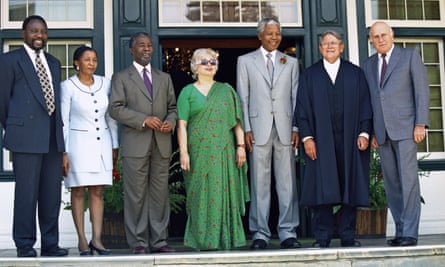Frene Ginwala, the first speaker of the National Assembly in post-apartheid South Africa, was a newly qualified lawyer working among Durban’s Indian community in a hostile country when, in March 1960, police shot dead 69 protestors in the black township of Sharpeville. She had not until then been involved in active politics but, with the African National Congress outlawed and thousands imprisoned in a state of emergency, she committed herself to the struggle. Ginwala, who has died aged 90 following a stroke, played a series of crucial roles in the achievement of black liberation.
She was not on the security police books so her anonymity was priceless. Walter Sisulu, one of the ANC big three, asked her to establish an underground escape route into neighbouring countries. She smuggled Oliver Tambo into (the then) Southern Rhodesia. With the entire leadership of the movement soon to be jailed for life, Tambo’s presence in exile was vital to the survival of the movement.
Within South Africa, Ginwala continued her work, chauffeuring Natal Indian Congress leaders around the country, raising money for families left destitute by the arrests and finding safe houses for activists hunted by the police.
With the police now on her trail, in late 1960 Ginwala fled to Dar es Salaam, in Tanganyika (soon to become Tanzania), where she helped Tambo open the ANC’s first external office. She later claimed that the movement had more missions abroad than South Africa had embassies.
She launched a newspaper, Spearhead, but her forthright views were not welcome and she was told to leave, only to be invited back by the country’s first president, Julius Nyerere, to establish a national newspaper, the Standard. Once again her views displeased and once again she was banished. During her 30 years of exile from South Africa, she lived in Zambia, Mozambique, Tanzania and the UK, becoming a leading voice for the ANC internationally, before returning in 1990, when she helped negotiate the country’s transition to democracy.
Ginwala was born in Johannesburg, the granddaughter of Parsees who had migrated from Bombay (now Mumbai) in the 1890s. Her parents, Naswan Ginwala, a businessman, and his wife, Banoo, were well-to-do and, after early schooling in Fordsburg, Johannesburg’s Indian quarter, Frene was sent to India for her secondary education. She then took a law degree at the University of London and qualified as a barrister at the Inner Temple. Years later she obtained a philosophy doctorate from Oxford, where she was an honorary fellow at Linacre College.

Once she had moved permanently to the UK in the late 1970s, Tambo appointed her head of political research in his office, a job well-suited to her particular skills, which involved writing, broadcasting, public speaking, undertaking diplomacy at the highest levels at the United Nations, and travelling to centres of influence to break down fears of a communist takeover of South Africa, with its strategic position and mining wealth.
Her persistence helped persuade the Conservative foreign secretary Geoffrey Howe to meet Tambo, despite his prime minister Margaret Thatcher having described Nelson Mandela as “nothing but a terrorist”. In the build-up to the end of apartheid, Ginwala engaged friend and foe alike, her approach always level and unheated, her appearance très soignée, a sari ever over her shoulder. But she had a steely will, an insider noted, “and she never hesitated to make clear that the ANC would take whatever steps were necessary to secure democracy for South Africa”.
Ginwala returned home after the apartheid president FW de Klerk lifted the ban on the liberation movements in February 1990. She was appointed to the secretariat in Mandela’s office and was head of the ANC research department from 1991 to 1994. In 1992 she set up a national coalition, a “conspiracy of women’”, made up of many political persuasions, faith groups, trade unions and civil society aimed at ensuring that women were not overlooked in the negotiations for the post-apartheid constitution. They were not, as it turned out, but the other key demand – an end to violence against women – has not been achieved.
It helped that Ginwala, and two other women, had the ear of Mandela – though the future president rather blotted his copybook by talking of “a beautiful young Parsee woman”. Ginwala wondered if he would have described Thabo Mbeki (Mandela’s successor) as “a handsome young Xhosa man”.
She was elected to the new parliament in South Africa’s first democratic elections, in April 1994. With her track record it was inevitable that the ANC’s huge majority would choose Ginwala as its speaker. Once again she combined fairness with firmness. Douglas Gibson, leader of the mainly white-supported Democratic Alliance, said “she was determined to see that the smallest parties … were entitled to be respected and heard in every debate, every portfolio committee and every committee. Today, 30 years later, this is … perhaps Ginwala’s greatest legacy.”
Serving for 10 years, Ginwala retired in 2004 and continued to promote good governance and human rights through the UN and other international institutions. She served a term as chancellor of the University of KwaZulu-Natal from 2005 and was a founding trustee of the Nelson Mandela foundation. The South African president, Cyril Ramaphosa, said: “Many of the rights and material benefits South Africans enjoy today have their origins in the legislative programme of the inaugural democratic parliament under Dr Ginwala’s leadership.”
She is survived by her nephews, Zavareh, Cyrus and Sohrab.

 1 year ago
79
1 year ago
79










 English (US)
English (US)